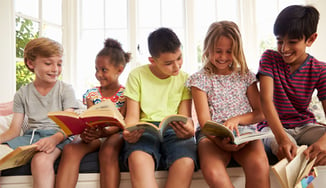 Learning to read can be challenging for children. Fortunately, research is now available that suggests how to give each child a good start in reading. When parents help their children learn to read, they help open the door to a new world.
Learning to read can be challenging for children. Fortunately, research is now available that suggests how to give each child a good start in reading. When parents help their children learn to read, they help open the door to a new world.
As a parent, you can begin an endless learning chain:
- You read to your children
- They develop a love of stories and poems
- They want to read on their own
- They practice reading
- They start to read for information or pleasure.
Even after your children start to read for themselves, you can still read to your children to continue building a love of reading. A general rule of thumb is that your children should read books that are at their ability level, while the books you read to your children should be at a slightly higher level of difficulty and within an area of interest.
Becoming a good reader involves the development of some essential skills, including:
- Oral-Language
- Use language in conversation
- Listen and respond to stories read aloud
- Recognize and name the letters of the alphabet
- Listen to sounds of spoken language
- Connect sounds to letters to figure out the "code" of reading
- Frequently read so that recognizing words becomes natural and automatic
- Learn and use new words
- Have an understanding of what was read
- Rhyming
Read books with rhymes. Teach your child rhymes, short poems, and songs. Play simple rhyming games. Ex. How many words can you make up that sound like the word "bat." - Alphabet
Practice pointing and saying the letter names and sounds in your child's name. Point out letter wherever you see them (labels, boxes, street signs, etc.). Read alphabet books. - Reading
Let your child read to you even if they don't say all the words correctly. Read to your child every day. Keep reading the same books—children need practice in reading comfortably and with expression using books they know. - Comprehension
Talk with your child about what you are reading to them. Talk about new words that your child may not know. Talk about the story, characters, places, and events that took place in the book. Ask what new information your child learned from the book. Encourage your child to try to read the book on his own.
DID YOU KNOW: Cleveland Hearing & Speech Center in University Circle is one of the many locations of the Little Free Library. To encourage reading and literacy in children, any child may choose a book to read and keep.









